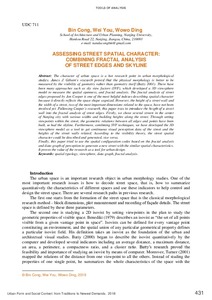ASSESSING STREET SPATIAL CHARACTER: COMBINING FRACTAL ANALYSIS OF STREET EDGES AND SKYLINE
Скачать файл:
URI (для ссылок/цитирований):
https://elib.sfu-kras.ru/handle/2311/111715Автор:
Bin, Cong
Wei, You
Wowo, Ding
(Bin Cong, Wei You, Wowo Ding: School of Architecture and Urban Planning, Nanjing University, Hankou Road 22, Nanjing, Jiangsu, China, 210093 e-mail: nandacongbin@gmail.com)
Дата:
2019-05Proceedings of the XXV ISUF International Conference “Urban Form and Social Context: from Traditions to Newest Demands” (Krasnoyarsk, July 5–9, 2018)
Аннотация:
The character of urban space is a hot research point in urban morphological studies. James J. Gibson’s research proved that the physical morphology is better to be measured by the visibility of geometry rather than geometry itself (Batty 2001). There have been many approaches such as sky view factors (SVF), which developed a 3D viewsphere model to measure the spatial openness, and fractal analysis. The fractal analysis of street edges proposed by Jon Cooper is one of the most helpful indexes describing spatial character because it directly reflects the space shape cognized. However, the height of a street wall and the width of a street, two of the most important dimensions related to the space, have not been involved yet. Following Cooper’s research, this paper tries to introduce the height of a street wall into the fractal analysis of street edges. Firstly, we chose several streets in the center of Nanjing city with various widths and building heights along the street. Through setting viewpoints within the street, the geometric relations between all edges and points have been built, so had the skyline. Furthermore, combining SVF techniques, we have developed the 3D viewsphere model as a tool to get continuous visual perception data of the street and the heights of the street walls related. According to the visibility theory, the street spatial character could be described and generated, vice versa.
Finally, this paper tried to use the spatial configuration codes based on the fractal analysis and data-graph of perception to generate a new street with the similar spatial characteristics. It proves the value of the research as a tool for urban design.

